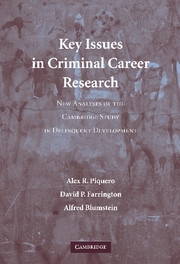 Key Issues in Criminal Career Research
Key Issues in Criminal Career Research Published online by Cambridge University Press: 30 July 2009
Do those males experiencing an early onset of offending commit more crimes over time than their later-onset counterparts? This is a question that is central to several contemporary developmentally based criminological theories. For example, it may be that both individual offending frequency and offense seriousness increase with age and peak at a higher level for early-starters. That is what some developmental theorists would argue (see Loeber and Hay, 1994; Moffitt, 1993), presumably because early onset is an indicator of a more severe tendency toward delinquency and criminal activity.
In official and self-report records, early onset predicts a relatively large number of offenses in total (Farrington et al., 1990; Le Blanc and Fréchette, 1989). Using official records, several studies show that individual offending frequency is approximately constant after onset (Farrington et al., 1998:101; Hamparian et al., 1978:60l; Tarling, 1993:57). Across individuals, Tolan and Thomas (1995) and Krohn et al. (2001) showed that the frequency of offending in self-reports was greatest for those with the earliest ages of onset. Recently, Farrington et al. (2003), using data from the Seattle Social Development Project, investigated how strongly an early age of onset predicts a large number of offenses (in total and per year) in self-reports compared with court referrals. Their findings indicated that an early age of onset predicted a large number of offenses in both self-reports and court referrals.
To save this book to your Kindle, first ensure [email protected] is added to your Approved Personal Document E-mail List under your Personal Document Settings on the Manage Your Content and Devices page of your Amazon account. Then enter the ‘name’ part of your Kindle email address below. Find out more about saving to your Kindle.
Note you can select to save to either the @free.kindle.com or @kindle.com variations. ‘@free.kindle.com’ emails are free but can only be saved to your device when it is connected to wi-fi. ‘@kindle.com’ emails can be delivered even when you are not connected to wi-fi, but note that service fees apply.
Find out more about the Kindle Personal Document Service.
To save content items to your account, please confirm that you agree to abide by our usage policies. If this is the first time you use this feature, you will be asked to authorise Cambridge Core to connect with your account. Find out more about saving content to Dropbox.
To save content items to your account, please confirm that you agree to abide by our usage policies. If this is the first time you use this feature, you will be asked to authorise Cambridge Core to connect with your account. Find out more about saving content to Google Drive.